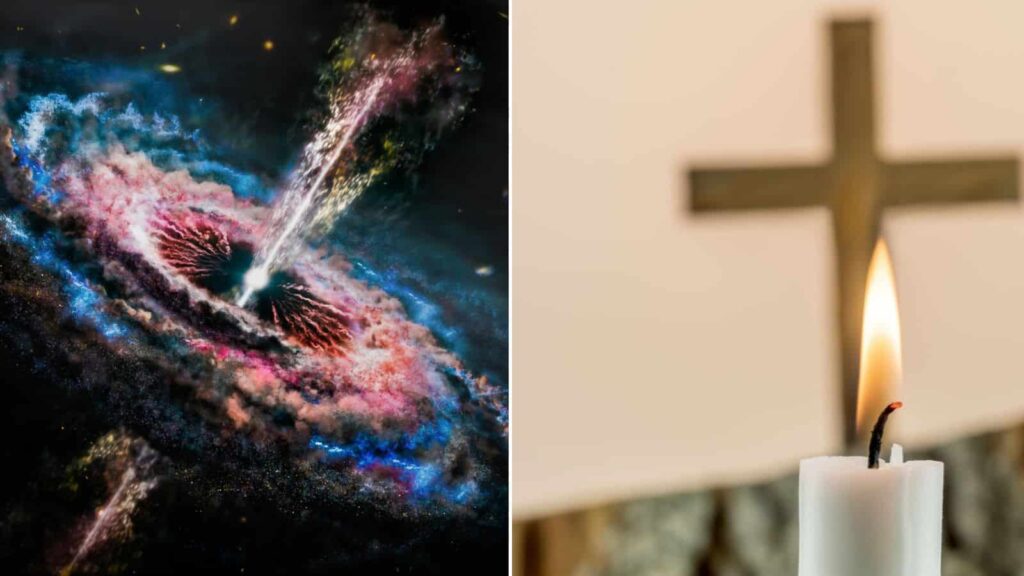Philosophy has always been a realm where the deepest questions about existence, morality, and life’s meaning are debated. These discussions often intersect with religious beliefs and atheistic viewpoints, offering a diverse range of perspectives across cultures. Here are 18 of the most common and hard-to-answer philosophical confusions or doubts that religious individuals and atheists alike must confront in order to fully be confident in their views, especially before sharing those views with others. We may never get the answers, but it’s important to question what we believe in order to challenge both our upbringings and ourselves.
The Existence of God

One of the most fundamental questions in philosophy is whether God exists. Theists argue for the existence of a divine being based on faith, personal experiences, and philosophical arguments such as the cosmological and teleological arguments. On the other hand, atheists assert that the lack of empirical evidence and the presence of suffering in the world undermine claims of a benevolent, omnipotent God.
The Nature of Reality

Materialists assert that reality is fundamentally composed of physical matter and energy, adhering to scientific principles that explain the universe through natural laws. In contrast, spiritual perspectives propose the existence of non-physical entities, such as souls or spiritual realms, that transcend the material world, offering explanations for consciousness and subjective experiences.
The Question of Evil

A perennial challenge for religious believers is the problem of evil: if God is omnipotent and benevolent, why do evil and suffering exist? Theodicies attempt to reconcile this dilemma by suggesting that suffering serves a greater purpose or is necessary for free will, while atheists argue that the existence of evil contradicts the attributes of an all-loving and all-powerful deity.
Morality

Questions about the nature of morality probe whether ethical principles are objective truths independent of human beliefs or subjective constructs shaped by cultural norms and individual perspectives. Religious frameworks often ground morality in divine commandments or natural law, whereas atheists might appeal to reason, empathy, and social contracts as foundations for ethical behavior.
The Afterlife

Beliefs about what happens after death vary widely across religions and among atheists. Many religious traditions posit an afterlife where souls are judged based on their earthly actions, offering either eternal reward or punishment. In contrast, atheistic perspectives generally assert that death signifies the end of consciousness, with no existence beyond physical life.
Free Will

The debate over free will delves into whether human beings possess the ability to make autonomous choices or whether our actions are predetermined by factors such as genetics, environment, or divine will. Theists often reconcile divine omniscience with human agency, while atheists may argue for a deterministic worldview shaped by natural laws and causal processes.
The Origin of the Universe

Questions about the origins of the universe confront religious creation narratives and scientific cosmology. Creation myths and religious texts offer accounts of divine creation ex nihilo, while scientific theories such as the Big Bang propose naturalistic explanations rooted in observable phenomena and cosmic evolution.
Purpose and Meaning in Life

Existential questions about the purpose and meaning of life challenge individuals to find significance in a seemingly indifferent universe. Religious perspectives often imbue life with purpose through divine plans or spiritual growth, whereas atheists may seek meaning through personal fulfillment, relationships, and contributions to society.
Religious Diversity

The diversity of religious beliefs raises questions about the truth claims of different faith traditions and the possibility of religious pluralism. Dialogue between religious and atheist perspectives explores whether all religions offer glimpses of a larger truth or whether conflicting beliefs necessitate exclusivity in truth claims.
Miracles and Supernatural Events

Claims of miracles and supernatural events provoke discussions about the nature of evidence, faith, and skepticism. Religious adherents view miracles as divine interventions that affirm their faith, while skeptics may approach such claims through scientific scrutiny and the principles of natural law.
The Rationality of Faith

Faith, defined as belief in the absence of empirical evidence or logical proof, evokes debate about its rationality and justification. Religious believers argue that faith is a virtue that transcends reason, fostering spiritual growth and trust in divine providence. Atheists may critique faith as an irrational belief unsupported by empirical evidence.
Compatibility or Conflict Between Science and Religion

The relationship between science and religion spans from historical conflicts over cosmology and evolution to contemporary dialogues about ethics and metaphysics. Some view science and religion as complementary domains that address different aspects of human experience, while others perceive inherent tensions between empirical inquiry and faith-based beliefs.
Moral Responsibility

Questions about moral responsibility consider whether individuals are ultimately accountable to divine judgment, societal norms, personal conscience, or a combination of these factors. Religious teachings often emphasize accountability to God or spiritual authorities, whereas secular ethics prioritize responsibility toward fellow humans and future generations.
Secular Ethics

Atheistic and secular moral frameworks advocate for ethical principles grounded in reason, empathy, and humanistic values rather than religious doctrines. Discussions explore whether moral virtues can be cultivated independently of religious beliefs and the implications for societal cohesion and personal integrity.
The Problem of Divine Hiddenness

The concept of divine hiddenness addresses why an omnipotent and loving God might not reveal definitive evidence of existence to all individuals. Theists may argue that divine hiddenness fosters genuine faith and moral autonomy, while atheists critique it as inconsistent with a benevolent deity’s desire for a relationship with humanity.
Human Nature

Philosophical inquiries into human nature examine whether individuals possess innate tendencies toward goodness, malevolence, or neutrality. Religious perspectives often incorporate concepts of original sin or inherent goodness, while secular perspectives may attribute behavior to biological, psychological, and sociocultural factors.
The Ethics of Belief

The ethics of belief scrutinize the standards by which individuals justify their religious convictions, ethical principles, and worldview commitments. Debates encompass epistemological questions about evidence, rationality, and the responsibility to critically evaluate beliefs in light of available information.
Meaningful Existence

Ultimately, philosophical questions challenge individuals to confront uncertainties about existence, morality, and the pursuit of meaning. Whether grounded in religious faith, philosophical inquiry, or existential reflection, these inquiries invite exploration, dialogue, and personal introspection.
In navigating these profound questions, individuals encounter diverse perspectives that enrich understanding, encourage empathy, and foster intellectual growth. Engaging with these philosophical inquiries cultivates a deeper appreciation for the complexities of human experience and the pursuit of truth across varied worldviews.
30 Traditional Sayings That Are Now Considered Offensive by Woke Culture

30 Traditional Sayings That Are Now Considered Offensive by Woke Culture
21 Habits Often Associated With Having a Lower Social Status

21 Habits Often Associated With Having a Lower Social Status
25 Social Issues Gen Z are Determined to Cancel

